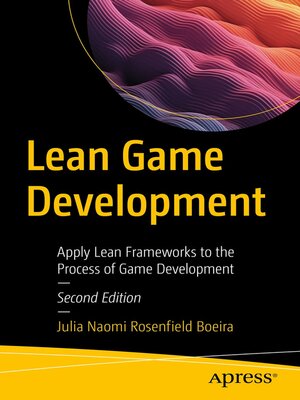Lean Game Development
ebook ∣ Apply Lean Frameworks to the Process of Game Development · Professional and Applied Computing
By Julia Naomi Rosenfield Boeira

Sign up to save your library
With an OverDrive account, you can save your favorite libraries for at-a-glance information about availability. Find out more about OverDrive accounts.
Find this title in Libby, the library reading app by OverDrive.



Search for a digital library with this title
Title found at these libraries:
| Library Name | Distance |
|---|---|
| Loading... |
Master Lean UX and Lean Startup techniques to improve your agile game development experience beyond Scrum. This updated version of the book focuses on applying lean and agile methodologies to the game development process and features improved examples, applied techniques, and a whole new section explaining how to test a game in Unity with CI.
You'll see how to define a minimum viable product (MVP) for games with Lean Canvas, allowing customers to iterate over it and collect feedback for improvement at every cycle. All of these are achieved while still using standard Agile techniques. The first part of the book explains the ideation process of a game and how lean methodologies allow developers, especially small studios, to avoid scope creep. Next, it it provides guidance on creating MVPs and using player feedback to iterate and improve games. The book then discusses continual improvement (CI) methods. A crucial part of CI is generation of Lean Canvas.
LeanGame Development, Second Edition shows you how to iterate until you develop a game that satisfies developers, gamers, and your studio's financial goals.
What You'll Learn
Who This Book Is For
People from all sectors of the gaming industry will find the book useful in planning their project in a more iterative way, unloading the management burden on the development process and collecting feedback to improve the game content as early as possible.







